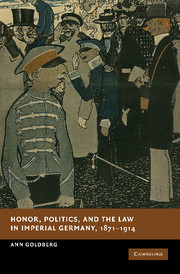2 - Honor disputes and everyday life
Published online by Cambridge University Press: 03 May 2010
Summary
“It is not only a right but a duty for anyone with claims to a respectable position in society to defend his honor when it is in any way attacked or called into question.”
“Don't be so sensitive!”
Judges in the Kaiserreich were driven to distraction by the landslide of defamation suits, most of which were the Privatklage of private citizens. Those with firsthand experience wrote in disgust about their daily encounters with insult suits that “stem from gossip and revolve around [legally] invalid issues,” most of these being “petty suits” dealing with “ludicrous tongue lashings … pettiness … [and] squabbling without any deeper meaning.” Overburdening the courts, these suits were “poisoning” social relations in whole communities:
The worst aspect of defamation suits is … that they poison the social climate of small towns more than all other lawsuits. Thus witnesses are hauled in for whom the whole matter, for personal reasons, is highly embarrassing; thus, old friendships are destroyed, old long forgotten matters are dug up and hostilities are provoked which otherwise would never have broken out.
Commentators in the press and the parliaments likewise bemoaned German “sensitivity” (Empfindlichkeit), the hypersensitivity to the tiniest slights, and the readiness to turn those feelings into lawsuits: “every swear-word uttered in back courtyards or on the street leads … to a solemn official proceeding,” complained the right-wing writer Richard Nordhausen.
- Type
- Chapter
- Information
- Publisher: Cambridge University PressPrint publication year: 2010

